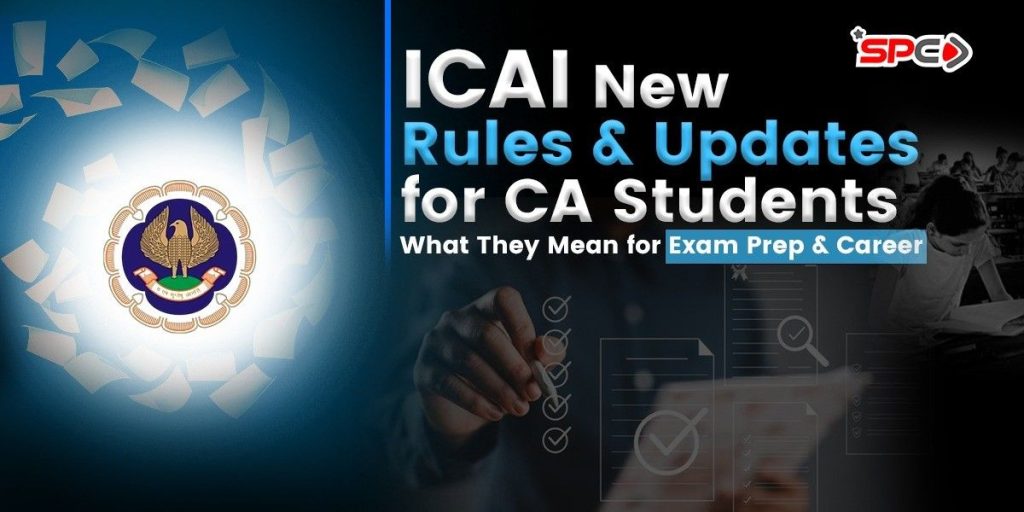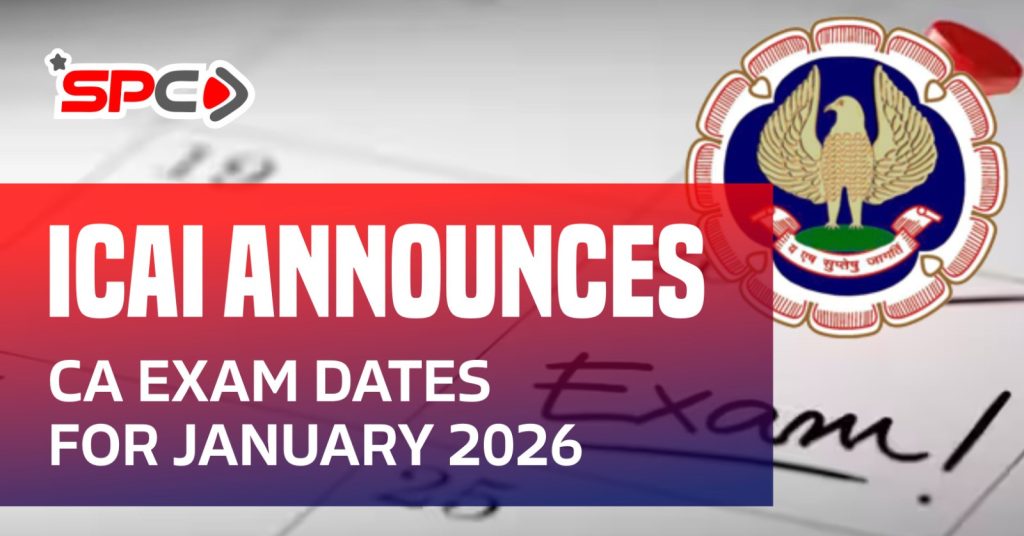This is a crucial time for CA students, as the Institute of Chartered Accountants of India (ICAI) has brought in a New Scheme of Education and Training with significant updates.
These changes, applicable from the May 2024 exams onwards, impact your exam preparation and overall career path.
Here is a simple, detailed breakdown of the most important new rules and what they mean for you.
1. Major Structural Changes (The Big Picture)
The new scheme is designed to make the CA course more practical, streamlined, and in line with global standards.
| Feature | Old Scheme | New Scheme (from May 2024) | What it Means for You |
| Number of Papers | Foundation: 4 papers (6 subjects) Inter: 8 papers Final: 8 papers | Foundation: 4 papers Inter: 6 papers (3 in each Group) Final: 6 papers (3 in each Group) | Less Subject Load at Intermediate & Final: More focused preparation. |
| Practical Training (Articleship) | 3 Years | 2 Years | Quicker Entry into the professional field. You save one year! |
| New Module | None | Self-Paced Online Modules (SPOM) | You must pass these online modules before appearing for the Final Exam. They cover topics removed from the main papers. |
| Exam Frequency | Twice a year (May/June & Nov/Dec) | Foundation & Intermediate: Thrice a year (Jan, May/June, Sept) Final: Twice a year (May & Nov) | More Attempts! If you fail, you don’t have to wait as long for the next chance. |
Subject & Syllabus Changes
The ICAI has consolidated and updated the syllabus at all levels to remove overlaps and enhance focus on core skills.
A. CA Foundation (4 Papers)
- Removed Subjects: Business Correspondence & Reporting and Business & Commercial Knowledge.
- New Papers:
- Accounting (100 Marks)
- Business Laws (100 Marks)
- Quantitative Aptitude (100 Marks – Maths, Logical Reasoning, Statistics)
- Business Economics (100 Marks)
- Key Detail for Exam: Papers 3 and 4 remain Objective (MCQ) type, and there is still Negative Marking (0.25 mark deduction) for incorrect answers in these two papers.
B. CA Intermediate (6 Papers)
The total papers are reduced from 8 to 6 (3 per group).
| Group | New Paper Name | Old Paper Combination/Changes |
| Group I | 1. Advanced Accounting | Combination of old Papers 1 & 5 (Accounting & Advanced Accounting) |
| 2. Corporate and Other Laws | More focus on the Companies Act. | |
| 3. Taxation | Income Tax & GST (No major structure change). | |
| Group II | 4. Cost and Management Accounting | No major structure change. |
| 5. Auditing and Code of Ethics | New emphasis on the Code of Ethics. | |
| 6. Financial Management and Strategic Management (FM: 50 Marks, SM: 50 Marks) | Combination of the remaining parts of old Papers 7 & 8. |
C. CA Final (6 Papers + Self-Paced Modules)
The total papers are reduced from 8 to 6 (3 per group). Two compulsory papers are moved to the Self-Paced Online Modules.
| Group | New Paper Name | Old Paper Changes |
| Group I | 1. Financial Reporting | No major structure change. |
| 2. Advanced Financial Management | Earlier: Strategic Financial Management (Name change) | |
| 3. Advanced Auditing, Assurance and Professional Ethics | No major structure change. | |
| Group II | 4. Direct Tax Laws & International Taxation | No major structure change. |
| 5. Indirect Tax Laws | No major structure change. | |
| 6. Integrated Business Solutions (Multidisciplinary Case Study with Strategic Management) | This is a new, compulsory paper focusing on complex case studies across subjects. |
The New Exam Pattern (Crucial for Prep!)
The new pattern impacts how you should study, especially at the Intermediate and Final levels.
Objective/MCQ Introduction
- CA Intermediate & Final: All six papers will now have a mix of 70% subjective (descriptive) questions and 30% case scenario/case-study based Multiple Choice Questions (MCQs).
- Impact on Prep: You must now focus on conceptual clarity and application-based learning, not just rote memorization. The MCQs will be application-oriented, testing your practical knowledge.
Key Detail: There is NO negative marking for the MCQ portion at the CA Intermediate and Final levels. This is a significant relief!
Passing Criteria & Exemptions
- Passing Criteria: Remains the same—40% minimum in each paper and 50% in aggregate for the group/both groups.
- New Exemption Rule: If you score 60 marks or more in any paper, that paper is now PERMANENTLY EXEMPTED. You don’t have to appear for it again in any subsequent attempt, unless you choose to surrender the exemption.
Practical Training (Articleship) & Mandatory Modules
Articleship (2 Years)
- Duration is 2 Years: This shorter period starts only after you have passed both groups of the Intermediate Exam and completed the ICITSS (Information Technology and Soft Skills) courses.
- Leave Limit: You are now allowed a maximum of 12 leaves per year (24 leaves over the two-year period). This is much stricter than the old scheme, so manage your leave carefully!
Self-Paced Online Modules (SPOM)
These are compulsory online subjects that you must clear before appearing for the CA Final exam. They are divided into four sets (A, B, C, and D).
- Sets A and B are Compulsory for ALL students:
- Set A: Corporate and Economic Laws (moved from CA Final old syllabus)
- Set B: Strategic Cost and Performance Management (moved from CA Final old syllabus)
- Sets C and D are Elective: You must choose one subject from Set C and one from Set D.
- Passing Criteria for SPOM: You must score a minimum of 50% marks in the online exam for each module.
Summary for Your Exam Preparation
| Action Item | How to Adapt Your Prep |
| Syllabus Streamlining | Focus intensely on the 6 main papers at Intermediate and Final. The reduced number allows for deeper study. |
| MCQ Practice | Integrate MCQ and case-study practice into your daily routine for Intermediate and Final subjects to score well on the 30% objective portion. |
| Articleship Planning | Plan to clear both Intermediate groups together or as quickly as possible to start your 2-year articleship early. |
| Conceptual Clarity | Emphasize understanding the concepts rather than just memorizing, as the case-study based questions require application. |
| SPOM Strategy | Start preparing and clearing the Self-Paced Online Modules (Sets A & B) during your articleship to avoid a last-minute rush before the Final exam. |
The new scheme is challenging but offers a more efficient path to becoming a Chartered Accountant. Plan your studies well, leverage the permanent exemption rule, and focus on practical application to ace your exams!




